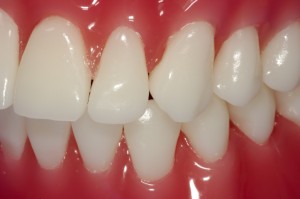 Gingivitis and more advanced forms of gum disease affect roughly 80% of our adult population. These oral infections can also affect children and teens, though not as frequently as adult cases. There are some common and easily detectable signs of gum disease, however the condition is almost impossible to control without the professional intervention of a periodontist.
Gingivitis and more advanced forms of gum disease affect roughly 80% of our adult population. These oral infections can also affect children and teens, though not as frequently as adult cases. There are some common and easily detectable signs of gum disease, however the condition is almost impossible to control without the professional intervention of a periodontist.
To prevent the long term effects of gum disease such as tooth loss and systemic damage, it is helpful to be on the lookout for the most common signs and symptoms:
- Bleeding, red gums
- Puffiness, tenderness, and inflammation
- Bad breath
- Shifting teeth, an increase in the spaces between the teeth
- Loose teeth
- Previous tooth loss
You may notice just one of these symptoms or a combination of several, and they may appear to be slightly noticeable or very noticeable. Try to avoid assessing these symptoms on your own. Whether the signs appear to be mild or minimal, seek professional periodontal care right away. Although you might have noticed some bleeding or inflammation on a few occasions, it is impossible to determine the true extent of the infection without a full periodontal evaluation.
During a clinical evaluation, dental x-rays, charting, and probing will provide a more complete picture as to the health of your gums. These diagnostic tools will also provide information about the health of the bone structure surrounding and supporting the teeth. Your evaluation will also include a discussion about your previous health history for more clues about how your body responds to gum disease.
If your suspicions are correct, and you are diagnosed with gum disease, professional periodontal therapy may be necessary to bring the infection under control. Once the appropriate treatment has been performed, you should continue to stay alert for signs that the infection has returned. You will also be advised to schedule periodic dental visits to monitor the symptoms that are not always visible to the naked eye.
If you suspect that you have gum disease or you have been previously treated for gum disease, contact our periodontist, Dr. Beth Tomlin, today for an appointment.






